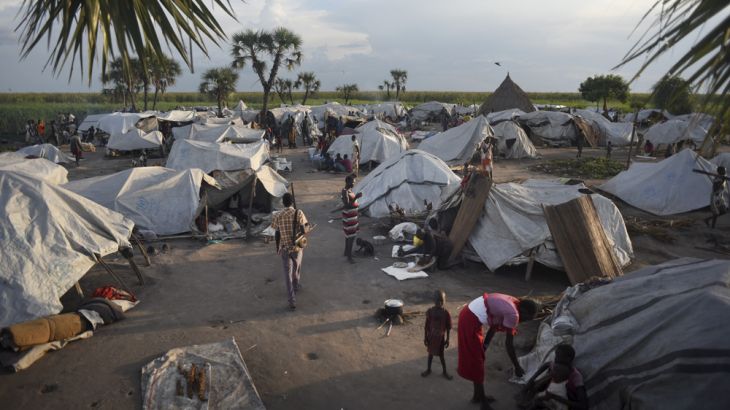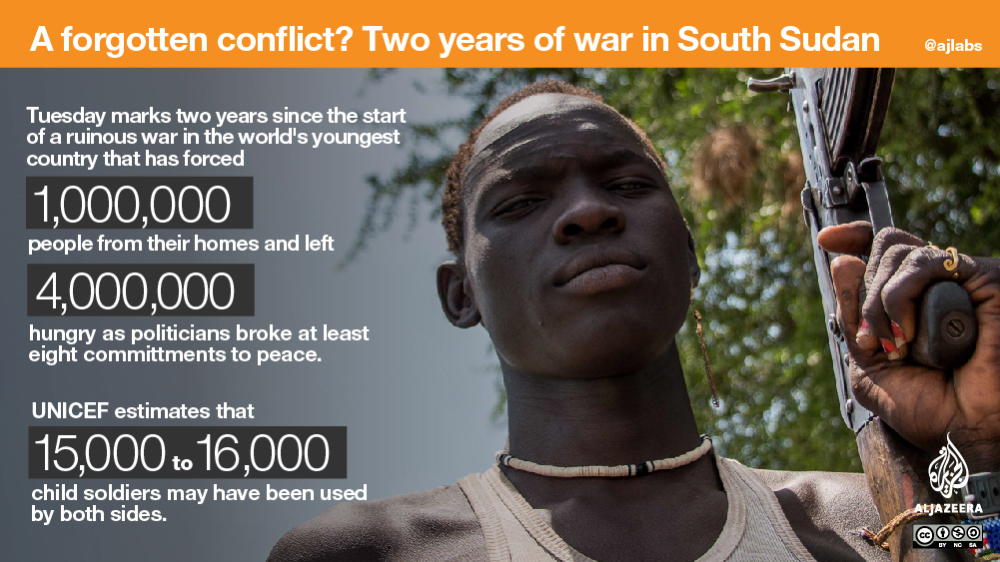South Sudan marks two years of ruinous war
Conflict rages on despite ceasefire deal, leaving more than one million displaced and four million severely hungry.

South Sudan on Tuesday marked two years since the start of a war that has forced one million people from their homes and left four million hungry as politicians broke at least eight commitments to peace.
The country descended into conflict in December 2013 after President Salva Kiir accused his former deputy Riek Machar, who he had sacked earlier that year, of plotting a coup.
Keep reading
list of 4 itemsSouth Sudan: President Kiir, VP Machar agree to resume talks
South Sudan’s Riek Machar, wife test positive for coronavirus
Will South Sudan’s latest peace deal last?
The clashes that followed set off a cycle of retaliatory killings that have split the world’s newest country, which won its independence from Sudan in 2011, along ethnic lines.
As President Kiir – from the Dinka ethnic group – fought it out with rebels allied to Machar – a Nuer – both sides committed atrocities, including massacres and gang rape, according to the UN and the African Union.
READ MORE: South Sudan – The many barriers to aid
Thousands of child soldiers have fought in the conflict, used as foot soldiers by both government and opposition forces, the US-based Human Rights Watch said.
Both sides have repeatedly accused each other of breaking a ceasefire that was agreed to in August, and a key deadline for Machar to return to the capital from his base in the bush was missed last month.
Refugee camps
Even with thousands of people sheltering inside UN camps across the country, many are still cut off from food and medical care, especially in the north near the border with Sudan.
Speaking to Al Jazeera from a UN camp in the north, Dr Austin Ombija, an official with the International Organization for Migration, said the camps were overcrowded and lacked basic healthcare facilities.
“We have to deal with a lot more patients than what we were envisioned to support. That causes a strain on us in terms of supplies, in terms of staffing, in terms of space that we use for constructing our facilities.”

Al Jazeera’s Hiba Morgan, reporting from Juba, said aid groups in South Sudan described conditions in the camps as deplorable.
“Many families are living in small spaces, with limited access to clean water and not enough food,” she said.
“Aid organisations here may differ in the role they play and the services they deliver, but they all agree on one thing: The people need peace and stability to be able to return home and resume their lives.
“Lives have been put on hold for two years, and may be put on hold for longer if the peace signed more than three months ago is not put into practice.”
Since the start of the war, at least eight ceasefires or power-sharing deals have been broken.
Kiir and Machar have traded accusations over the failed agreements but both say they are committed to the current accord despite missing every listed deadline.
Analysts say the conflict involves multiple militias – allied to Machar or Kiir – who pay little heed to paper peace deals and are often driven by local agendas or revenge attacks.
Broken promises: A timeline of ceasefires and deals
– 2014 –
January 23: Celebrations as Kiir and Machar sign their first ceasefire, agreed in Ethiopia and mediated by East Africa’s regional IGAD bloc. It is broken shortly after.
May 9: Kiir and Machar pray together, as mediators in Addis Ababa hail a deal “ending the war”.
August 25: Amid sanction warnings, Kiir and Machar ink another ceasefire in Addis Ababa, along with a deal to forge a unity government within 45 days.
October 20: In the Tanzanian town of Arusha, Kiir and Machar accept “collective responsibility” for the war, and call again for peace.
November 8: An “unconditional, complete and immediate end to all hostilities” is agreed by the rivals in Addis Ababa. It lasts a few hours.
– 2015 –
January 21: Kiir and Machar promise to make a “public apology” for the war and recommit to a ceasefire.
February 1: Another ceasefire commitment, and a deadline set for March 5 to agree on a final peace deal and establish a transitional government.
June 27: Kiir and Machar meet for five hours in Kenya, but sign no deal.
August 26: Under intense international pressure, Kiir signs a peace deal he calls a “reward for rebellion”. Machar signed it on August 17.
October 3: Kiir undermines a fundamental pillar of the power-sharing deal by ordering the number of regional states be nearly tripled.
November 24: The deadline for a rebel delegation – including Machar – to return to Juba and begin work as part of a “transitional government of national unity” is missed.
December 15: Low-level fighting continues in northern and southwestern parts of the country.
( Timeline by AFP )